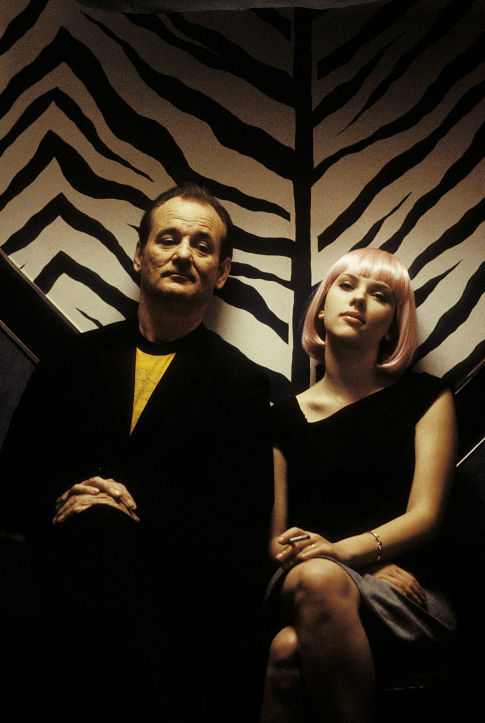"Translation" means to move (latio) across (trans), but it is
the disconnections in this movement that inspire Coppola, who almost certainly
had in mind Robert Frost's old axe about "poetry" being "what is lost in
translation" when she titled the film. Yet it is not merely the 'inscrutable'
 Japanese and culture that is lost in the translations experienced by Charlotte
and Bob. Alone among the bustling characters who fill the margins of the film, they are the ones who use the time, the silence, and the minimal reflection necessary to realize that emotion itself cannot be translated into words: articulation belies the reality of just feeling it. Thus they can never say to each other what they share, because the very act of putting it into words would change the delicate balance between trust and propriety.
Japanese and culture that is lost in the translations experienced by Charlotte
and Bob. Alone among the bustling characters who fill the margins of the film, they are the ones who use the time, the silence, and the minimal reflection necessary to realize that emotion itself cannot be translated into words: articulation belies the reality of just feeling it. Thus they can never say to each other what they share, because the very act of putting it into words would change the delicate balance between trust and propriety.
Likewise, for any critic to translate the looks and evocative tone of the scene in the karaoke bar into language lends the scene a permanence whose lack was exactly its success. Its poetry was the poetry of spaces, looks and sighs that stayed in the realm of the possible by never becoming explicit, romantic.
There are some familiar structures into which Bob and Charlotte's relationship can be fitted. For Harris, an aging film star stuck in foreign whisky commercials, his friendship with Charlotte is a glimpse of his lost youth. This is no flippant mid-life crisis like Steve Martin's lust for Sarah Jessica Parker in LA Story, but a passing, intense feeling of profound joy and regret. There is mutual attraction but it trembles at the edge because they both recognize it would destroy the moment and the memory of the week. It would reduce it, in other words, precisely to the familiar structure, the cliché, the translation. So instead, Harris sleeps with the dreary English cabaret singer out of some weary need to expel his desires. In doing so he translates, or sublimates, the intimacy of his relationship with Charlotte while maintaining the entirety of the status quo. Harris is married, but the tawdry affair is entirely in keeping with the practical, managerial nature of his marriage. Charlotte, we sense, would mean more than this.
For Americans, Japan is the place that is strange with no excuse. The Japanese have the money, they have the technology, they even had an American ruler for a number of years, so why are they so odd? Every few months the New York Times has an article chronicling how funnily the Japanese act. Locating Lost in Translation in Tokyo uses this stereotype to dislocate the characters, translated out of their own world and language, and lost together in the japaned international space of the hotel. The hotel might look like Japan, but it feels like the alienated utopia of here and now peddled by a thousand product advertisements. It might sound exotic to Charlotte's friend on the phone from the states, but for Charlotte the hotel has the same sterile ennui of a thousand suburban homes or office blocks in the west. Even the few moments in which Charlotte ventures out into the exotic east (replete with temples, monks, weddings in traditional dress, etc.) seem to fit too neatly into a box - "tourism" - for Charlotte's sensibility. This type of tourism is consumption: with the hotel as its factory this reduces the local culture to a commodity available to the most simple-minded of tourists. In doing so "tourism" moves very little of Japanese life across to the mind of the tourist and indeed leaves most of the authentic experience untranslated. In opposition to this, the poetry that Coppola's film wants to preserve from the Lysol of global business is not epic, but fragments of lyric caught on the frame of capital.



Carrying Light into Dark Times
Rabbi Zalman Schachter-Shalomi
With a Bible and a Gun:
The Prohetic Justice of Johnny Cash
Samuel Hayim Brody
Season of Revision
Jay Michaelson
Primal Scream Judaism
Temima Fruchter
More than This
Dan Friedman
Josh's Dinner
Josh Ring
Archive
Our 390 Back Pages
Saddies
David Stromberg
Zeek in Print
Buy online here
About Zeek
Events
Contact Us
Links
From previous issues:
Holocaust Video Testimonies
Dan Friedman
The other reality TV
Far from Heaven: Excavating Paradise
Peter Conklin & Dan Friedman
The 1950s through its own fantastic prism